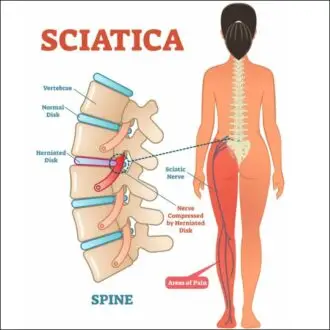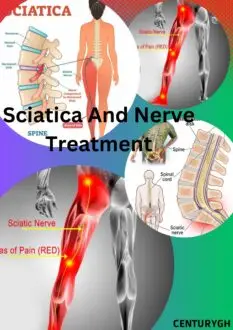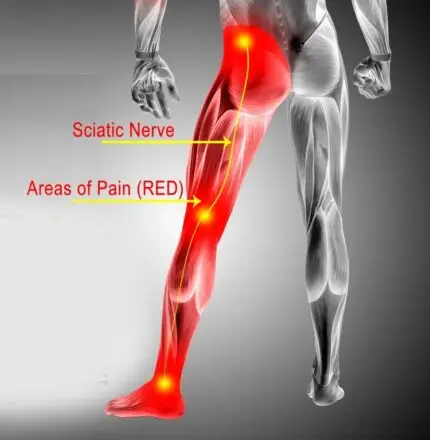Bone and Nerves
How to Treat Sciatica and Nerve- Effective Sciatica Treatment and Nerve Pain Relief
How to Treat Sciatica and Nerve Pain

If you’re struggling with sciatica and nerve pain, discovering the most effective treatments is essential for pain relief and improved quality of life. Here are proven methods for sciatica treatment and managing nerve pain:
- Physical Therapy for Sciatica: Engaging in targeted sciatica exercises designed by a physical therapist can strengthen your back muscles and improve flexibility, offering significant nerve pain relief.
- Pain Management: Over-the-counter and prescription medications, including anti-inflammatory drugs, can reduce inflammation and provide sciatica pain relief.
- Chiropractic Care: Spinal adjustments by a chiropractor can alleviate sciatic nerve compression, reducing lower back pain and promoting healing.
- Back Pain Remedies: Applying cold and heat therapy can help reduce inflammation and relax muscles, offering immediate pain relief.
- Alternative Treatments for Nerve Pain: Acupuncture and massage therapy can enhance blood flow and reduce muscle tension, providing long-term relief from sciatica.
- Non-Surgical Sciatica Treatment: Epidural steroid injections are a non-surgical option that can reduce severe nerve pain and inflammation.
- Home Remedies for Sciatica: Incorporating yoga and stretching exercises into your daily routine can improve flexibility and reduce the risk of future sciatica flare-ups.
- Chronic Sciatica Management: Adopting healthy spine habits, such as maintaining proper posture and engaging in regular exercise, can prevent chronic sciatica and promote overall back health.
Understanding and implementing these sciatica treatment options can lead to significant nerve pain relief and can improved quality of life. For personalized advice and treatment plans, consult with a healthcare professional specializing in pain management.
DO YOU NEED NATURAL TREATMENT FOR SCIATICA?

Causes Of Sciatica
1. **Herniated Disc:** When the soft inner material of a disc in the spine protrudes out and presses on the nearby nerves, including the sciatic nerve, it can cause irritation and inflammation, leading to sciatica.
2. **Degenerative Disc Disease:** Wear and tear of the discs between the vertebrae as part of the natural aging process can lead to disc degeneration, which may contribute to sciatica.
3. **Spinal Stenosis:** This is a condition where the spinal canal narrows, putting pressure on the spinal cord and nerves, including the sciatic nerve.
4. **Bone Spurs:** Extra bone growth, often due to osteoarthritis, can develop on the vertebrae and compress the nerve roots that form the sciatic nerve.
5. **Spondylolisthesis:** When a vertebra slips out of place and onto the vertebra below it, it can compress the nerves, including the sciatic nerve, causing pain.
6. **Piriformis Syndrome:** The piriformis muscle, located in the buttocks, can sometimes irritate or compress the sciatic nerve, leading to symptoms similar to sciatica.
7. **Trauma or Injury:** Any injury or trauma to the spine or buttocks region can potentially damage the sciatic nerve or surrounding structures, leading to sciatica.
8. **Obesity:** Excess body weight can put increased pressure on the spine and nerves, increasing the risk of developing sciatica.
Effects Of Sciatica
1. **Pain:** The hallmark symptom of sciatica is pain that radiates along the path of the sciatic nerve, typically from the lower back through the buttocks and down the back of the leg. This pain can vary from mild to severe and may be described as sharp, shooting, burning, or electric-like.
2. **Numbness and Tingling:** Along with pain, individuals with sciatica may experience numbness or tingling sensations in the affected leg or foot.
3. **Muscle Weakness:** Sciatica can cause weakness in the leg or foot muscles, making it difficult to walk, stand, or move normally.
4. **Difficulty Sitting or Standing:** The pain and discomfort associated with sciatica can make it challenging to find a comfortable sitting or standing position.
5. **Limited Mobility:** Severe cases of sciatica can significantly limit mobility and daily activities, impacting quality of life and overall well-being.
6. **Sleep Disturbances:** Pain from sciatica can interfere with sleep, leading to insomnia or disrupted sleep patterns.
7. **Emotional Impact:** Chronic pain from sciatica can take a toll on mental health, leading to feelings of frustration, anxiety, or depression.
Understanding the causes and effects of sciatica is crucial for proper diagnosis and effective management of this condition. Treatment typically involves a combination of pain management strategies, physical therapy, and in some cases, surgery. Early intervention and lifestyle modifications can also help prevent or alleviate symptoms of sciatica.


